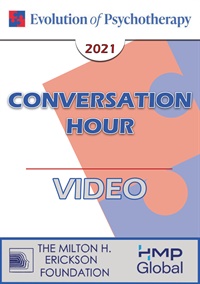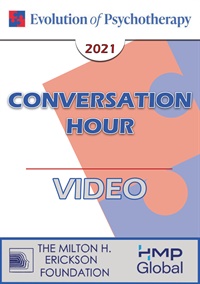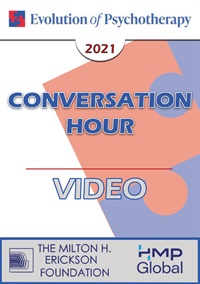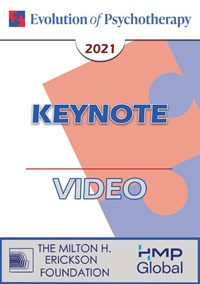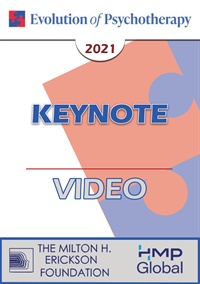- Average Rating:
- Not yet rated
- Topic Areas:
- Conversation Hours | Psychotherapy
- Categories:
- Evolution of Psychotherapy | Evolution of Psychotherapy 2021
- Faculty:
- Martin Seligman, PhD
- Course Levels:
- Master Degree or Higher in Health-Related Field
- Duration:
- 1 hour
- Format:
- Audio and Video
- Original Program Date:
- Dec 04, 2021
- Short Description:
- A conversation hour with Martin Seligman, PhD from the 2021 Evolution of Psychotherapy Conference.
- Price:
- $59.00 - Base Price
Tags: Psychotherapy
- Average Rating:
- Not yet rated
- Topic Areas:
- Conversation Hours | History of Psychotherapy | Psychotherapy
- Categories:
- Evolution of Psychotherapy | Evolution of Psychotherapy 2021
- Faculty:
- Jeffrey Zeig, PhD
- Course Levels:
- Master Degree or Higher in Health-Related Field
- Duration:
- 1 hour
- Format:
- Audio and Video
- Original Program Date:
- Dec 04, 2021
- Short Description:
- Dr Zeig will discuss and answer questions about some of the psychotherapy masters he has encountered, including Viktor Frankl, Milton Erickson and Virginia Satir.
- Price:
- $59.00 - Base Price
- Average Rating:
- Not yet rated
- Topic Areas:
- Abuse | Speeches | Psychotherapy | Ethical Practice | Therapeutic Relationship | Therapist Development
- Categories:
- Evolution of Psychotherapy | Evolution of Psychotherapy 2021 | Pioneers in Couples and Family Therapy
- Faculty:
- Claudia Black, PhD
- Course Levels:
- Master Degree or Higher in Health-Related Field
- Duration:
- 1 hour
- Format:
- Audio and Video
- Original Program Date:
- Dec 04, 2021
- Short Description:
- An examination of how abandonment in childhood creates toxic shame, leading to coping mechanisms like controlling behavior and perfectionism. This speech will also reveal how unmet emotional and physical needs impact personal development, and will offer insights into healing through empathy and self-awareness.
- Price:
- $59.00 - Base Price
- Average Rating:
- Not yet rated
- Topic Areas:
- Feedback Informed Treatment (FIT) | Psychotherapy | Speeches | Therapist Development
- Categories:
- Evolution of Psychotherapy | Evolution of Psychotherapy 2021
- Faculty:
- Scott Miller, PhD
- Course Levels:
- Master Degree or Higher in Health-Related Field
- Duration:
- 1 hour
- Format:
- Audio and Video
- Original Program Date:
- Dec 04, 2021
- Short Description:
- What can mental health professionals do to enhance their performance? Available evidence makes clear that attending a typical continuing education workshop, specializing in the treatment of a particular problem, or learning a new treatment model does little to improve effectiveness. In fact, studies to date indicate clinical effectiveness actually declines with time and experience in the field. The key to improved performance is engaging in deliberate practice. At this workshop, the latest research on deliberate practice will be translated into concrete steps all clinicians can immediately apply in their efforts to achieve better results.
- Price:
- $59.00 - Base Price
- Average Rating:
- Not yet rated
- Topic Areas:
- Psychotherapy | Speeches
- Categories:
- Evolution of Psychotherapy | Evolution of Psychotherapy 2021
- Faculty:
- Michael Miller
- Course Levels:
- Master Degree or Higher in Health-Related Field
- Duration:
- 1 hour
- Format:
- Audio and Video
- Original Program Date:
- Dec 04, 2021
- Short Description:
- Gestalt therapy envisions a radical conception of the self as temporal and emergent. This means it is a fluid self, continually changing through creative adjustment to its changing contacts with the world. One could think of the self in Gestalt therapy as an unending aesthetic project: Like all experience, it has to be made and remade as it navigates the passing of time. And it is reflexive, being both creator and created.
- Price:
- $59.00 - Base Price
Tags: Psychotherapy
- Average Rating:
- Not yet rated
- Topic Areas:
- Great Conversations | Psychoanalysis | Psychotherapy
- Categories:
- Evolution of Psychotherapy | Evolution of Psychotherapy 2021
- Faculty:
- Otto Kernberg, MD
- Course Levels:
- Master Degree or Higher in Health-Related Field
- Duration:
- 1 hour
- Format:
- Audio and Video
- Original Program Date:
- Dec 03, 2021
- Short Description:
- A Great Conversation featuring Otto Kernberg, MD, from the 2021 Evolution of Psychotherapy Conference.
- Price:
- $59.00 - Base Price
- Average Rating:
- Not yet rated
- Topic Areas:
- Great Conversations | Psychotherapy | Therapist Development
- Categories:
- Evolution of Psychotherapy | Evolution of Psychotherapy 2021
- Faculty:
- Donald Meichenbaum, PhD
- Course Levels:
- Master Degree or Higher in Health-Related Field
- Duration:
- 1 hour
- Format:
- Audio and Video
- Original Program Date:
- Dec 03, 2021
- Short Description:
- Unlike surgeons, psychotherapists usually do not get better with years of practice. Why is that? What skills are most important to develop in clinical training programs, and does it actually happen? Should we be focusing on evidence-based treatment techniques, interpersonal therapeutic skills, cultural competence, deliberate practice, scientific skepticism, fostering clients' strengths and resilience? Three seasoned clinical trainers reflect on the joys, challenges, and outcomes of preparing future psychotherapists.
- Price:
- $59.00 - Base Price
- Average Rating:
- Not yet rated
- Topic Areas:
- Psychotherapy | Speeches | Therapist Development
- Categories:
- Evolution of Psychotherapy | Evolution of Psychotherapy 2021
- Faculty:
- Donald Meichenbaum, PhD
- Course Levels:
- Master Degree or Higher in Health-Related Field
- Duration:
- 1 hour
- Format:
- Audio and Video
- Original Program Date:
- Dec 03, 2021
- Short Description:
- This presentation will discuss ways to bolster resilience across the full life span from high-risk children youth adults and the elderly. It will examine the neurobiological and psycho -social changes that accompany engaging in resilience-engendering behaviors.
- Price:
- $59.00 - Base Price
- Average Rating:
- Not yet rated
- Topic Areas:
- Psychotherapy | Speeches
- Categories:
- Evolution of Psychotherapy | Evolution of Psychotherapy 2021
- Faculty:
- Daniel Amen, MD
- Course Levels:
- Master Degree or Higher in Health-Related Field
- Duration:
- 1 hour
- Format:
- Audio and Video
- Original Program Date:
- Dec 03, 2021
- Short Description:
- We are on the cusp of a new revolution that will change mental health care forever. The End of Mental Illness discards an outdated, stigmatizing paradigm and replaces it with a modern brain-based, whole-person program rooted in science and hope. No one is shamed for cancer or diabetes; likewise, no one should be shamed for depression and other brain health/mental health issues. Based on the world's largest functional brain imaging database, Dr. Amen will give you a completely new way to think about and treat issues such as anxiety, depression, bipolar disorders, ADHD, addictions, OCD, PTSD, schizophrenia and even personality disorders.
- Price:
- $59.00 - Base Price
Tags: Psychotherapy
- Average Rating:
- Not yet rated
- Topic Areas:
- Psychotherapy | Speeches | Therapist Development
- Categories:
- Evolution of Psychotherapy | Evolution of Psychotherapy 2021
- Faculty:
- Derald Wing Sue, PhD
- Course Levels:
- Master Degree or Higher in Health-Related Field
- Duration:
- 1 hour
- Format:
- Audio and Video
- Original Program Date:
- Dec 03, 2021
- Short Description:
- "In the United States, the omnipresence of racial bias and bigotry has led many to question the reasons for their persistence in light of widespread public condemnation. Social scientists have proposed a number of reasons for people’s failure to act: (a) the invisibility of modern forms of bias, (b) trivializing an incident as innocuous, (c) diffusion of responsibility, (d) fear of repercussions or retaliation, and (e) the paralysis of not knowing what to do. This presentation is aimed at addressing the last reason by providing participants with a repertoire of anti-bias strategies and tactics to overcome the expressions of microaggressions.
- Price:
- $59.00 - Base Price
- Average Rating:
- Not yet rated
- Topic Areas:
- Clinical Demonstrations | Experiential Therapy | Psychotherapy
- Categories:
- Evolution of Psychotherapy | Evolution of Psychotherapy 2021
- Faculty:
- Jeffrey Zeig, PhD
- Course Levels:
- Master Degree or Higher in Health-Related Field
- Duration:
- 1 hour
- Format:
- Audio and Video
- Original Program Date:
- Dec 03, 2021
- Short Description:
- Hypnotic psychotherapy uses both formal trance and methods derived from hypnosis.
- Price:
- $59.00 - Base Price
- Average Rating:
- Not yet rated
- Topic Areas:
- Clinical Demonstrations | Emotionally Focused Therapy (EFT) | Psychotherapy
- Categories:
- Evolution of Psychotherapy | Evolution of Psychotherapy 2021
- Faculty:
- Sue Johnson, EdD
- Course Levels:
- Master Degree or Higher in Health-Related Field
- Duration:
- 1 hour
- Format:
- Audio and Video
- Original Program Date:
- Dec 03, 2021
- Short Description:
- EFIT expands the clients sense of self and emotional balance. This session will show key moves in the EFIT Tango - the key intervention sequence in EFIT. This intervention shapes corrective emotional experiences that prime secure connection with both self and others.
- Price:
- $59.00 - Base Price
- Average Rating:
- Not yet rated
- Topic Areas:
- Conversation Hours | Psychotherapy | Gottman Method
- Categories:
- Evolution of Psychotherapy | Evolution of Psychotherapy 2021
- Faculty:
- John Gottman, PhD | Julie Gottman, PhD
- Course Levels:
- Master Degree or Higher in Health-Related Field
- Duration:
- 1 hour
- Format:
- Audio and Video
- Original Program Date:
- Dec 03, 2021
- Short Description:
- A conversation hour with John and Julie Gottman from the 2021 Evolution of Psychotherapy Conference.
- Price:
- $59.00 - Base Price
Tags: Gottman Method Psychotherapy
- Average Rating:
- Not yet rated
- Topic Areas:
- Conversation Hours | Psychoanalysis | Psychotherapy
- Categories:
- Evolution of Psychotherapy | Evolution of Psychotherapy 2021
- Faculty:
- Nancy McWilliams
- Course Levels:
- Master Degree or Higher in Health-Related Field
- Duration:
- 1 hour
- Format:
- Audio and Video
- Original Program Date:
- Dec 03, 2021
- Short Description:
- Although researchers evaluating therapy outcomes necessarily rely on measures of symptom relief and behavior change, practicing clinicians – and many patients – often have a more ambitious vision of meaningful change and growth. In this conversation hour, we will talk about the therapeutic goals of increased attachment security, sense of agency, affect tolerance, flexibility and maturity of defenses, self-reflection, mentalization, realistic and reliable self-esteem, vitality, capacity to mourn what cannot be changed, and overall engagement in love, work, and play.
- Price:
- $59.00 - Base Price
Tags: Psychoanalysis Psychotherapy
- Average Rating:
- Not yet rated
- Topic Areas:
- Clinical Demonstrations | Generative Psychotherapy | Psychotherapy | Art and Creativity
- Categories:
- Evolution of Psychotherapy | Evolution of Psychotherapy 2021
- Faculty:
- Stephen Gilligan, PhD
- Course Levels:
- Master Degree or Higher in Health-Related Field
- Duration:
- 1 hour
- Format:
- Audio and Video
- Original Program Date:
- Dec 02, 2021
- Short Description:
- "This demonstration will show how activating a client's creative process is the key factor in generative psychotherapy. This process follows these steps: (1) Opening a creative safe space (2) Identifying a goal (A positive change or transforming a negative pattern) (3) Identifying and welcoming both obstacles and resources (4) Weaving and integrating the parts into a new "mosaic of self" (5) Orienting to future application of changes. Therapy is successful when clients are able to experientially realize positive life changes. While the identification and transformation of symptoms is important in this regard, the activation of the client's creative capacity to change is even more important. This paper outlines 6 steps in this therapeutic process: (1) opening a mindful field, (2) setting positive intentions, (3) developing and maintaining a creative state, (4) identifying a "storyboard" for achieving goals, (5) transforming negative experiences, and (6) everyday practices. Metho
- Price:
- $59.00 - Base Price
- Average Rating:
- Not yet rated
- Topic Areas:
- Attachment | Great Conversations | Psychotherapy
- Categories:
- Evolution of Psychotherapy | Evolution of Psychotherapy 2021
- Faculty:
- Sue Johnson, EdD
- Course Levels:
- Master Degree or Higher in Health-Related Field
- Duration:
- 1 hour
- Format:
- Audio and Video
- Original Program Date:
- Dec 02, 2021
- Short Description:
- Psychotherapy is in chaos - it needs a clear path forward that integrates research, theory and practice. Attachment science offers us a clear way to on target interventions that bring out clients home to health and resilience.
- Price:
- $59.00 - Base Price
- Average Rating:
- Not yet rated
- Topic Areas:
- Great Conversations | Psychotherapy | Therapist Development
- Categories:
- Evolution of Psychotherapy | Evolution of Psychotherapy 2021
- Faculty:
- Scott Miller, PhD
- Course Levels:
- Master Degree or Higher in Health-Related Field
- Duration:
- 1 hour
- Format:
- Audio and Video
- Original Program Date:
- Dec 02, 2021
- Short Description:
- "Although therapists certainly need a clear clinical road map informing their work with clients, a rigid reliance on and allegiance to any particular theoretical model ignores what research tells us about what really matters most in therapy. More, being overly focused on implementing clinical protocols prevents us from being truly present with our clients -- the place where real therapeutic magic resides. Join two therapists as they trace the evolution of their thinking from being team members who helped develop the Solution Focused Brief Therapy model through today. Discover what they’ve learned about the real catalyst for change in therapy."
- Price:
- $59.00 - Base Price
- Average Rating:
- Not yet rated
- Topic Areas:
- Keynotes | Psychotherapy | Storytelling | Strategic Therapy | Ericksonian Hypnosis and Therapy Techniques
- Categories:
- Evolution of Psychotherapy | Evolution of Psychotherapy 2021 | Pioneers in Couples and Family Therapy
- Faculty:
- Cloe Madanes, HDL, LIC
- Course Levels:
- Master Degree or Higher in Health-Related Field
- Duration:
- 1 hour
- Format:
- Audio and Video
- Original Program Date:
- Dec 02, 2021
- Short Description:
- Madanes presents her strategic family therapy approach, focusing on changing family dynamics to resolve issues. She emphasizes the use of respectful directives, avoiding labels, and tailoring interventions like reversing hierarchy for struggling parents and creating positive memories for couples. Madanes also shares her 15-step method for addressing sexual abuse, centered on spiritual healing and apology. She highlights the need to adapt therapy for diverse families and challenges the dominance of individual treatment models and medication.
- Price:
- $59.00 - Base Price
- Average Rating:
- Not yet rated
- Topic Areas:
- Psychotherapy | Speeches | Therapist Development
- Categories:
- Evolution of Psychotherapy | Evolution of Psychotherapy 2021
- Faculty:
- Stephen Gilligan, PhD
- Course Levels:
- Master Degree or Higher in Health-Related Field
- Duration:
- 1 hour
- Format:
- Audio and Video
- Original Program Date:
- Dec 02, 2021
- Short Description:
- This talk identifies the seven core dimensions of an effective, sustainable therapy change: 1. a state of positive well being, 2. a positive resonant goal, 3. resources, 4. welcoming obstacles, 5. fluid "ideas of achievement", 6. commitment to practical action, 7. commitment to daily practices. The practical ways to develop and integrate these complementary dimensions will be highlighted.
- Price:
- $59.00 - Base Price
- Average Rating:
- Not yet rated
- Topic Areas:
- Grief | Psychotherapy | Speeches
- Categories:
- Evolution of Psychotherapy | Evolution of Psychotherapy 2021
- Faculty:
- Donald Meichenbaum, PhD
- Course Levels:
- Master Degree or Higher in Health-Related Field
- Duration:
- 1 hour
- Format:
- Audio and Video
- Original Program Date:
- Dec 02, 2021
- Short Description:
- The COVID-19 pandemic has resulted in over 500,000 deaths. In the aftermath, Prolong and complicated grief affects about 20% of loved ones. This presentation will discuss how to treat such individuals.
- Price:
- $59.00 - Base Price
- Average Rating:
- Not yet rated
- Topic Areas:
- Object Relations Theory | Psychotherapy | Speeches
- Categories:
- Evolution of Psychotherapy | Evolution of Psychotherapy 2021
- Faculty:
- Otto Kernberg, MD
- Course Levels:
- Master Degree or Higher in Health-Related Field
- Duration:
- 1 hour
- Format:
- Audio and Video
- Original Program Date:
- Dec 02, 2021
- Short Description:
- Analysis of history, essential structural components, implications for neurobiological predispositions and applications to psychosocial Analysis.
- Price:
- $59.00 - Base Price
- Average Rating:
- Not yet rated
- Topic Areas:
- Emotionally Focused Therapy (EFT) | Psychotherapy | Speeches
- Categories:
- Evolution of Psychotherapy | Evolution of Psychotherapy 2021
- Faculty:
- Sue Johnson, EdD
- Course Levels:
- Master Degree or Higher in Health-Related Field
- Duration:
- 1 hour
- Format:
- Audio and Video
- Original Program Date:
- Dec 02, 2021
- Short Description:
- Emotionally focused individual therapy - EFIT - offers a research based on target integrated approach to emotional disorders - depression, anxiety and PTSD. The 5 moves of the EFIT Tango create reliable key change events in every session.
- Price:
- $59.00 - Base Price
- Average Rating:
- Not yet rated
- Topic Areas:
- Clinical Demonstrations | Psychotherapy | Transference Focused Psychotherapy (TFP) | Transference / Countertransference
- Categories:
- Evolution of Psychotherapy | Evolution of Psychotherapy 2021
- Faculty:
- Otto Kernberg, MD
- Course Levels:
- Master Degree or Higher in Health-Related Field
- Duration:
- 1 hour
- Format:
- Audio and Video
- Original Program Date:
- Dec 01, 2021
- Short Description:
- This is a presentation of a video of a psychotherapy session.
- Price:
- $59.00 - Base Price
- Average Rating:
- Not yet rated
- Topic Areas:
- Art and Creativity | Keynotes | Psychotherapy
- Categories:
- Evolution of Psychotherapy | Evolution of Psychotherapy 2021
- Faculty:
- Irvin Yalom, PhD
- Course Levels:
- Master Degree or Higher in Health-Related Field
- Duration:
- 1 hour
- Format:
- Audio and Video
- Original Program Date:
- Dec 01, 2021
- Short Description:
- A Keynote featuring Irvin Yalom, PhD, from the 2021 Evolution of Psychotherapy Conference.
- Price:
- $59.00 - Base Price

EP20 Clinical Demonstration 11 - Learn to Read Brain Scans: 50 Scans in 60 Minutes - Daniel Amen, MD
- Average Rating:
- Not yet rated
- Topic Areas:
- Neuroscience | Neurobiology | Clinical Demonstrations | Psychotherapy
- Categories:
- Evolution of Psychotherapy | Evolution of Psychotherapy 2020
- Faculty:
- Daniel Amen, MD
- Course Levels:
- Master Degree or Higher in Health-Related Field
- Duration:
- 1 hour
- Format:
- Audio and Video
- Original Program Date:
- Dec 13, 2020
- Short Description:
- Based on the world's largest database of brain SPECT (single photon emission computed tomography) scans, Dr. Amen will teach attendees about brain SPECT imaging and then show 50 cases in 60 minutes, including cases of depression, anxiety, attention deficit hyperactivity disorder, post traumatic stress disorder, schizophrenia, traumatic brain injury, addiction, and dementia.
- Price:
-
Sale is $29.00
price reduced from Base Price - $59.00



